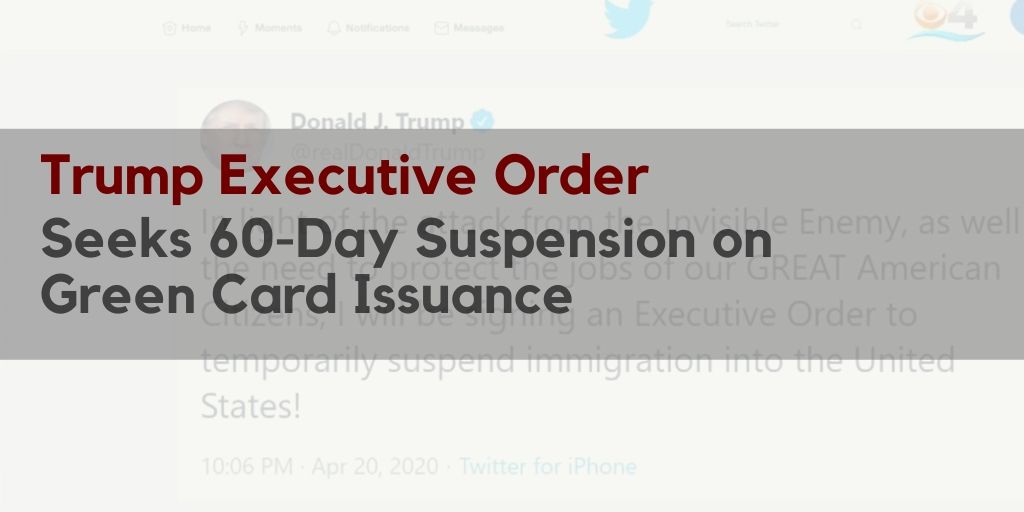President Trump Seeks to Bar Certain Immigrants from Entering U.S. for 60 Days
In a late night tweet, on April 20th, President Trump indicated that he would suspend immigration into the United States during the coronavirus outbreak. The actual executive order has just been signed and released and it indicates that starting 11:59 pm eastern time on April 23, 2020 certain immigrants will be banned from entering the U.S. for a period of 60 days. There are many exceptions and the restrictions do not apply to nonimmigrants (visitors, students, including work visas) or to applicants who are in the U.S. seeking a status change, extension or adjustment.
This continues to be a developing situation so please check back this page for updates or subscribe to our weekly newsletter.
Executive Order Limits Temporarily Issuance of Green Cards
The executive order suspends for 60 days entry into the U.S. of immigrants (those seeking admission as lawful permanent residents) who are outside of the U.S. as of April 22, 2020; do not have an immigrant visa that is valid as of April 22, 2020; and do not have official travel document other than a visa (such as transportation letter/boarding foil, or advance parole).
Exceptions
There are many exceptions.
First, the executive order does not apply to those who are already green card holders – essentially, to individuals who already hold green cards and are seeking to travel into the U.S. (as opposed to seeking to enter the U.S. for the first time as immigrants).
The executive order exempts healthcare professionals, Covid-19 researchers or other professionals focused on combating the disease.
Spouses and children under 21 years of age of U.S. citizens are exempt. So are EB-5 immigrant visa investors and members of the military (plus spouses and children). Special Immigrant visa (SI or SQ) and any other cases which are deemed to be in the national interest are also exempt from the ban,
Issuance of Nonimmigrant Visas, Entry into U.S. of Nonimmigrants and Change, Extension and Adjustment of Status In U.S. Is Not Restricted
One of the major concerns after the tweet announcement and the actual publication of the executive order was the unclear nature of the scope of the ban and concerns that the ban may include many nonimmigrant visa categories and applications filed from within the U.S.
The executive order restrictions are aimed at stopping immigrants from obtaining immigrant visas and entering the U.S. The order does not limit the issuance of nonimmigrant visas (including visitor, student, work, etc.). The order does not limit the entry into the U.S. of nonimmigrants who have such visas.
The executive order does not limit the ability of nonimmigrants who are currently in the U.S. to file for a change of status, extension of status, or to seek to adjust status to that of a lawful permanent resident from within the U.S.
Impact on Employment Based Immigration
The executive order is likely to impact only a minor subset of employment based candidates – specifically, those who are outside of the U.S. and seeking to enter the U.S. using an immigrant visa. The vast majority of employment based green cards are processed via adjustment of status and such applications are not affected.
Similarly, H-1B, L-1, TN, E and other nonimmigrant work visas remain outside of the scope of the executive order and are unaffected. The H-1B cap season is not affected, so are H-1B extensions, transfers, or amendments.
Currently ongoing or upcoming applications for employment-based permanent residency from within the U.S. – such as PERM Labor Certifications, I-140 immigrant petitions, and I-485 adjustment of status applications are not impacted by this executive order.
However, the President had suggested that some restrictions, including certifications of non-displacement of U.S. workers may be coming in a subsequent executive order.
Visa Issuance and Certain USCIS Services Suspended Anyway
To provide additional context, we should point out that nonimmigrant and immigrant visa issuance at U.S. consulates abroad has been suspended as a result of the Coronavirus/Covid-19 pandemic. Similarly, certain USCIS services have been put on hold as well, including biometrics and green card interviews as USCIS field offices.
Conclusion
Overall, the executive order is much narrower in scope than it was initially advertised by the President and it includes a lot of exceptions. It will nonetheless impact a number of prospective immigrants to the U.S. and our office is ready to assist applicants who may be affected by this temporary ban.
Our office will provide updates and alerts on this and related topics so please subscribe to our free weekly newsletter. Also please contact us if our office can be of any assistance.
Related News and Articles
The Capitol Immigration Law Group has been serving the business community for over 15 years and is one of the most widely respected immigration law firms focused solely on U.S. employment-based immigration. Disclaimer: we make all efforts to provide timely and accurate information; however, the information in this article may become outdated or may not be applicable to a specific set of facts. It is not to be construed as legal advice.

